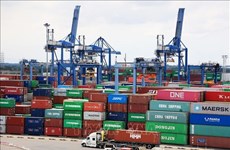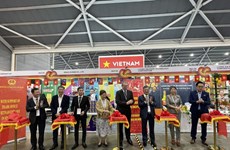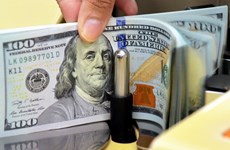Agriculture to eliminate “bottlenecks” in bid to attract FDI
Agriculture, one of the most competitive economic sectors in
Vietnam, needs to develop a long-term strategy to attract foreign
direct investment (FDI), which has fallen in recent years.
Fifteen years ago, FDI inflows into the agriculture, forestry and fishery sector accounted for 15 percent of the country’s total FDI, but this declined to less than 0.5 percent in the past three years.
Fifteen years ago, FDI inflows into the agriculture, forestry and fishery sector accounted for 15 percent of the country’s total FDI, but this declined to less than 0.5 percent in the past three years.
Agriculture, one of the most competitive economic sectors in
Vietnam, needs to develop a long-term strategy to attract foreign
direct investment (FDI), which has fallen in recent years.
Fifteen years ago, FDI inflows into the agriculture, forestry and fishery sector accounted for 15 percent of the country’s total FDI, but this declined to less than 0.5 percent in the past three years, Vice Chairman of the Vietnam Association of Foreign-Invested Enterprises Nguyen Van Toan said.
Statistics from the Ministry of Planning and Investment showed that the total new FDI capital to Vietnam increased to 21.6 billion USD in 2013 from 14.7 billion USD in 2011. However, the amount of capital invested in agriculture declined to 86.7 million USD in 2013 from 130.7 million USD in 2011.
As of September this year, the agricultural sector had 514 FDI projects worth 3.63 billion USD, accounting for 3.01 percent of total FDI projects and 1.5 percent of the total registered capital. The agricultural sector ranks ninth among 18 economic sectors with foreign investment. Taiwan topped the list of the over 30 nations and territories investing in the sector.
On average, the agricultural sector attracts 20 FDI projects out of the 17,072 projects licensed each year, with an average investment capital of just 6.6 million USD compared to 14.7 million USD for other FDI projects.
The allocation of FDI is uneven, with 78 percent of total FDI in agriculture poured into afforestation and timber processing.
Furthermore, the sector failed to attract investors from countries with advanced technologies, such as the US , Japan , and European countries.
Toan said the agricultural sector failed to attract investments because it makes profits at a slower rate than other sectors, while it is also more at risk from natural disasters and price shocks.
Besides, Do Nhat Hoang, Director of the Ministry of Planning and Investment’s Foreign Investment Agency, noted that Vietnam ’s agricultural sector is still lacking a long-term strategy as well as clear priorities for foreign investment.
Underdeveloped rural infrastructure and changing policies in many localities are also major barriers that restrict investors’ interest in the agricultural sector, many experts said.
Toan said since it is a challenge to attract foreign investment in agricultural production, Vietnam needs to instead encourage investments in processing industries. The country currently exports mainly raw agricultural products.
To develop the processing industries, localities should focus on ensuring an adequate and stable supply of products to serve the needs of large-scale processing facilities and make it easier for businesses to apply cutting-edge technology to production lines.
In an effort to promote the quantity and quality of FDI in agriculture, Minister of Agriculture and Rural Development Cao Duc Phat said the ministry will overhaul its policies to encourage foreign investment in the sector, thus creating a better business climate.
He added that the ministry is currently designing a project to improve the attraction and management of FDI in the agriculture, forestry and fishery sector for the 2015-2020 period with a view to 2030, thus removing the gap between policy and reality.-VNA
Fifteen years ago, FDI inflows into the agriculture, forestry and fishery sector accounted for 15 percent of the country’s total FDI, but this declined to less than 0.5 percent in the past three years, Vice Chairman of the Vietnam Association of Foreign-Invested Enterprises Nguyen Van Toan said.
Statistics from the Ministry of Planning and Investment showed that the total new FDI capital to Vietnam increased to 21.6 billion USD in 2013 from 14.7 billion USD in 2011. However, the amount of capital invested in agriculture declined to 86.7 million USD in 2013 from 130.7 million USD in 2011.
As of September this year, the agricultural sector had 514 FDI projects worth 3.63 billion USD, accounting for 3.01 percent of total FDI projects and 1.5 percent of the total registered capital. The agricultural sector ranks ninth among 18 economic sectors with foreign investment. Taiwan topped the list of the over 30 nations and territories investing in the sector.
On average, the agricultural sector attracts 20 FDI projects out of the 17,072 projects licensed each year, with an average investment capital of just 6.6 million USD compared to 14.7 million USD for other FDI projects.
The allocation of FDI is uneven, with 78 percent of total FDI in agriculture poured into afforestation and timber processing.
Furthermore, the sector failed to attract investors from countries with advanced technologies, such as the US , Japan , and European countries.
Toan said the agricultural sector failed to attract investments because it makes profits at a slower rate than other sectors, while it is also more at risk from natural disasters and price shocks.
Besides, Do Nhat Hoang, Director of the Ministry of Planning and Investment’s Foreign Investment Agency, noted that Vietnam ’s agricultural sector is still lacking a long-term strategy as well as clear priorities for foreign investment.
Underdeveloped rural infrastructure and changing policies in many localities are also major barriers that restrict investors’ interest in the agricultural sector, many experts said.
Toan said since it is a challenge to attract foreign investment in agricultural production, Vietnam needs to instead encourage investments in processing industries. The country currently exports mainly raw agricultural products.
To develop the processing industries, localities should focus on ensuring an adequate and stable supply of products to serve the needs of large-scale processing facilities and make it easier for businesses to apply cutting-edge technology to production lines.
In an effort to promote the quantity and quality of FDI in agriculture, Minister of Agriculture and Rural Development Cao Duc Phat said the ministry will overhaul its policies to encourage foreign investment in the sector, thus creating a better business climate.
He added that the ministry is currently designing a project to improve the attraction and management of FDI in the agriculture, forestry and fishery sector for the 2015-2020 period with a view to 2030, thus removing the gap between policy and reality.-VNA













